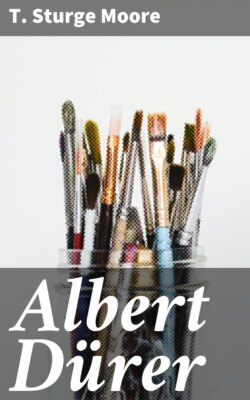Читать книгу Albert Dürer - T. Sturge Moore - Страница 37
На сайте Литреса книга снята с продажи.
VI
ОглавлениеTable of Contents
It may be that to this period belongs the meeting with Jacopo de' Barbari to which a passage in his MS. books (now in the British Museum) refers: and that already he began to be exercised on the subject of a canon of proportions for the human figure. In the chapter which I devote to his studies on this subject it will be seen how the determination to work the problem out by experiment, since Jacopo refused to reveal, and Vitruvius only hinted at the secret, led to his discovering something of far more value than it is probable that either could have given him. And yet the belief that there was a hidden secret probably hindered him from fully realising the importance of his discovery, or reaping such benefit from it as he otherwise might have done. How often has not the belief that those of old time knew what is ignored to-day, prevented men from taking full advantage of the conquests over ignorance that they have made themselves! Because what they know is not so much as they suppose might be or has been known, they fail to recognise the most that has yet been known--the best foundation for a new building that has yet been discovered--and search for what they possess, and fail to rival those whose superiority over themselves is a delusion of their own hearts. So early Dürer may have begun this life-long labour which, though not wholly vain, was never really crowned to the degree it merited: while others living in more fertile lands reaped what they had not sown, he could only plough and scatter seed. As Raphael is supposed to have said, all that was lacking to him was knowledge of the antique.
Perhaps many will blame me for writing, unlearned, as I am; in my opinion they are not wrong; they speak truly. For I myself had rather hear and read a learned man and one famous in this art than write of it myself, being unlearned. Howbeit I can find none such who hath written aught about how to form a canon of human proportions, save one man, Jacopo (de' Barbari) by name, born at Venice and a charming painter. He showed me the figures of a man and woman, which he had drawn according to a canon of proportions; and now I would rather be shown what he meant (i.e., upon what principles the proportions were constructed) than behold a new kingdom. If I had it (his canon), I would put it into print in his honour, for the use of all men. Then, however, I was still young and had not heard of such things before. Howbeit I was very fond of art, so I set myself to discover how such a canon might be wrought out. For this aforesaid Jacopo, as I clearly saw, would not explain to me the principles upon which he went. Accordingly I set to work on my own idea and read Vitruvius, who writes somewhat about the human figure. Thus it was from, or out of, these two men aforesaid that I took my start, and thence, from day to day, have I followed up my search according to my own notions.
